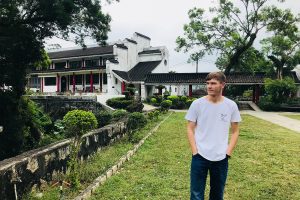Postcards From China Blog #12: Exploring Hong Kong
December 14, 2018
Tyler Thompson ’19 explores cultural difference in Hong Kong. Learn more about Asbury’s China Study Abroad program.

After three months in China, going to Hong Kong was like going to a whole new country. Every available surface is covered in advertising, from buildings to billboards to buses. The cars drive on the opposite side of the road from the rest of China. Traffic is more orderly and people take well-organized queues seriously. There’s a separate currency, and many people speak a mix of Mandarin Chinese, British English and Cantonese. People dress more as we do in the West, and are less closed off to strangers and foreigners. It is a first-class metropolitan city with obvious influences of 99 years of British influence.
For me, Hong Kong seemed drastically different from all other Chinese cities. Part of this effect was the greater freedoms the people of Hong Kong experience compared to the typical Chinese city-dweller. Hong Kong residents have access to a freer press, the right to assemble peaceably, and unrestricted internet access. There were certainly times in China proper when we were aware of its more limited freedoms. This was not the case in Hong Kong; this really helped me to reflect on the differences I’d observed between our cultures- China and the U.S.A. Americans place a high value on individual freedom and autonomy, sometimes at the cost of personal safety. Chinese place a high value on unity and peace, sometimes at the cost of individual freedom. It is certainly a reflection of the cultural differences between individualism and collectivism.
In order to reconcile these differences, I had to learn to be a learner. Both cultures have misconceptions about the other. No, in China the police don’t come to drag you away if you make one joke about the president. No, in America you won’t be shot just walking down the street. Yes, China could value individual persons more. Yes, America would benefit from valuing relationships and the betterment of the group more. When we learn from each other, we can become better people and societies.
In Hong Kong, we got a taste of that fusion of East and West, even if only in part. As Paul says in 1 Corinthians 13 — “now we see only a reflection as in a mirror; then we shall see face to face. Now I know in part; then I shall know fully…” And Jesus says in Luke 13, “people will come from east and west and north and south, and will take their places at the feast in the kingdom of God.” That is God’s vision for Jesus’ bride – a church divided not by race or creed or culture, but, as John Oxenham put it, joined in “one great fellowship of love throughout the whole wide earth.”